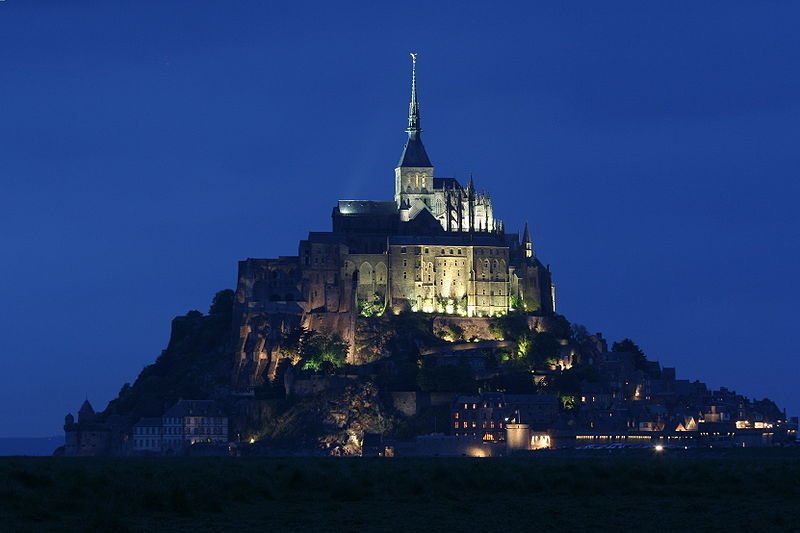 Mont Saint-Michel at night
Mont Saint-Michel at nightSource: https://commons.wikimedia.org/wiki/File:Mont_Saint-Michel_01.jpg
Author: Nono vlf

Mont Saint-Michel is one of the most famous tourist attractions in France among the French people. It is an abbey that sits on a picturesque tidal island off the coast of Normandy, on the northeast of France.Mont St-Michel is about one kilometer from mainland France, at the mouth of the Couesnon River near Avranches, and is connected to the mainland by a causeway. The mount is a block of granite that has resisted erosion when the coastline was formed over million of years.
Mont-St-Michel and its Bay were inscribed as a World Heritage Site during the 3rd session of the World Heritage Committee meeting in Cairo and Luxor, Egypt, on 22nd to the 26th of October, 1979.
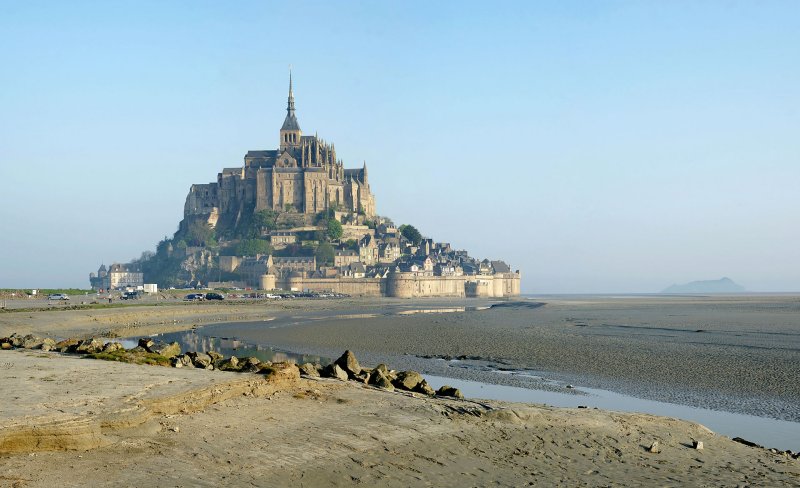 Mont Saint-Michel as seen from the coast at low tide
Mont Saint-Michel as seen from the coast at low tideSource: https://commons.wikimedia.org/wiki/Category:General_views_of_Mont_Saint-Michel#mediaviewer/File:Le_Mont_Saint-Michel.jpg
Author: Hans Hillewaert

World Heritage Site Inscription Details
Location: N 48 38 8.016 W 1 30 38.016 in the Department of Manche, Region of Basse-NormandieInscription Year: 1979
Type of Site: Cultural
Inscription Criteria: I, IIIr, VI
View of Mont-St-Michel from its causeway parking area. View Larger Map
View of Mont-St-Michel from the base. View Larger Map
A shopping street at Mont-St-Michel. View Larger Map
View from Mont-St-Michel towards the causeway. View Larger Map During medieval times, a land bridge links Mont Saint-Michel to the mainland. At high tide, this land bridge is submerged cutting the link. This gives Mont Saint-Michel a mysterious appeal, being an island half the time. Over the centuries, however, the coastal flats were polderized. The Couesnon River was also canalized, reducing the flow and increasing siltation on the bay. The land bridge was fortified into a causeway in 1879, preventing the tide from scouring the silt around it. In June 2006, a project was announced to build a hydraulic dam that will remove the accumulated silt and allow Mont Saint-Michel to become an island again.
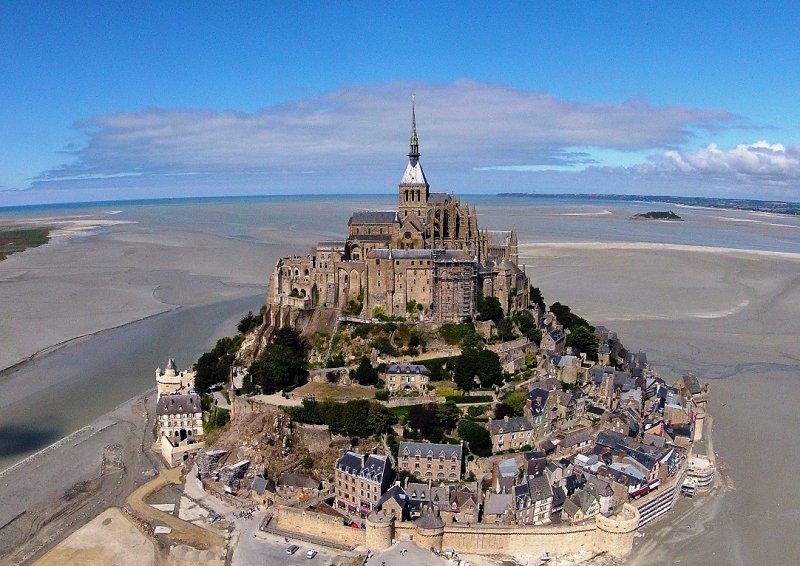 Aerial view of Mont Saint-Michel
Aerial view of Mont Saint-MichelSource: https://commons.wikimedia.org/wiki/Category:General_views_of_Mont_Saint-Michel#mediaviewer/File:L%27Abbaye_du_Mont-Saint-Michel,_vue_du_ciel.JPG
Author: Sylvain Verlaine

Before it was used by monks beginning in the 8th century, Mont Saint-Michel was known as Mont Tombe. According to legend, the monastery was built by St Aubert, the bishop of Avranches, who was visited by the archangel Michael. The angel instructed St Aubert to build a monastery on the rocky mount. Aubert was said to have repeatedly ignored the angel's instructions, until the angel burned a hole in his skull. When William "Long Sword", the Duke of Normandy, annexed the Cotentin Peninsula, Mont Saint-Michel gained in significance. Under the patronage of dukes, the abbey on Mont Saint-Michel was constructed in Normandy architectural style. When the monastery threw its support to Duke William of Normandy in his claim for the English throne, the duke rewarded it with land in England. This includes a small island in Cornwall which becomes the English equivalent, and is called St Michael's Mount.
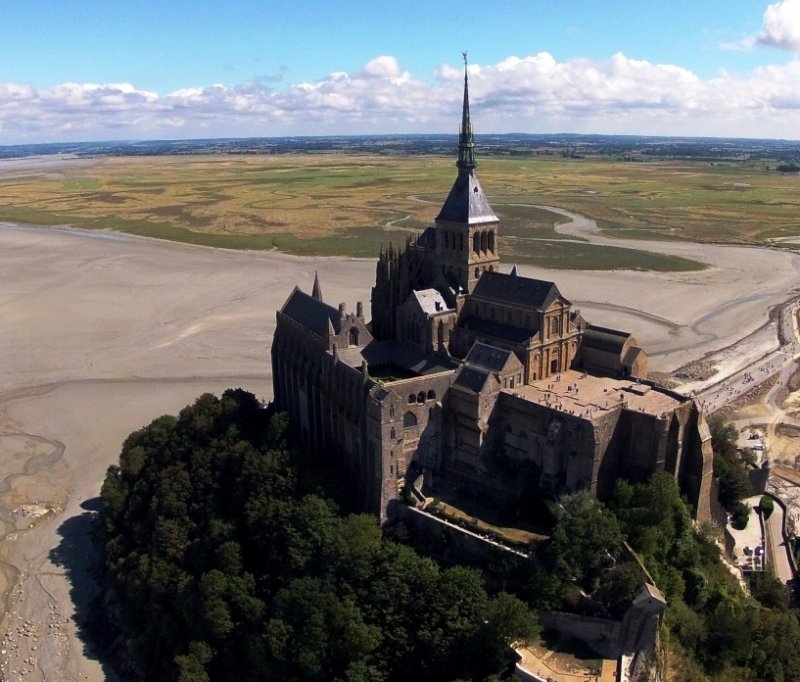 Another aerial view of Mont Saint-Michel, looking in the direction of the French mainland
Another aerial view of Mont Saint-Michel, looking in the direction of the French mainlandSource: https://commons.wikimedia.org/wiki/Category:General_views_of_Mont_Saint-Michel#mediaviewer/File:L%27Abbaye_du_Mont-Saint-Michel,_vue_du_ciel_2.JPG
Author: Sylvain Verlaine

During the Hundred Years' War, the English attempted repeatedly to invade Mont Saint-Michel, was it successfully defended itself with its formidable walls. A medieval cannon left by the English in their 1423-24 siege is still on display at the outer defense wall of the island.
The original abbey on Mont Saint-Michel was designed by Italian architect William de Volpiano in the 11th century. He designed a Romanesque church in cruciform, and placed the crossing of the four arms at the top of the mount. Underground crypt and chapels were incorporated into the design to compensate for the weight.
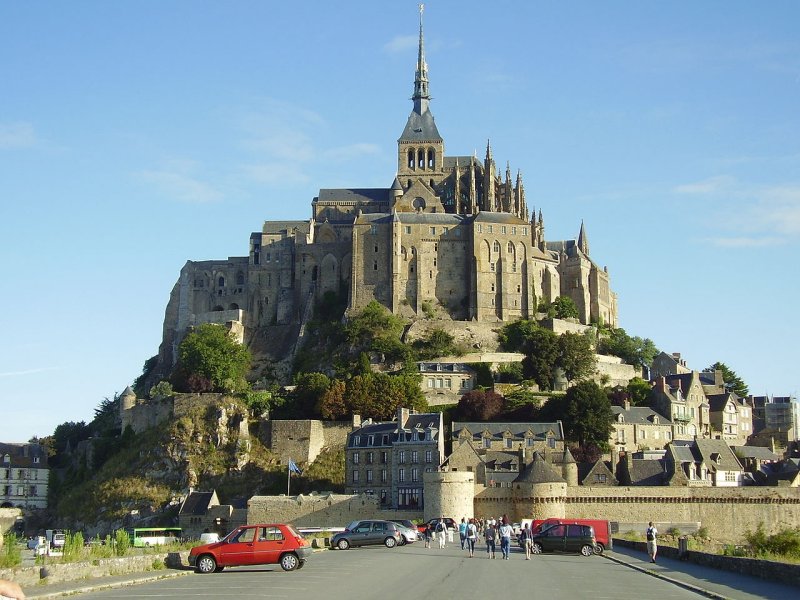 Mont Saint-Michel from the causeway
Mont Saint-Michel from the causewaySource: https://commons.wikimedia.org/wiki/Category:General_views_of_Mont_Saint-Michel#mediaviewer/File:Mont-Saint-Michel_2008_PD_02.JPG
Author: Kamel15

The buildings on Mont Saint-Michel was reenforced in the 12th century by Robert de Thorigny, a supporter of King Henry II of England who also happened to be Duke of Normandy. In 1204, Guy de Thours, who is allied to the Philip II Augustus, the King of France, set fire to the buildings and massacred the population. Horrified by what Guy de Thours did, Philip Augustus offered a grant to the Abbot Jourdain to rebuilt the church. It was constructed in the new Gothic style, and included a refectory and cloister. King Charles II added fortifications to the abbey mount and strengthened the ramparts.
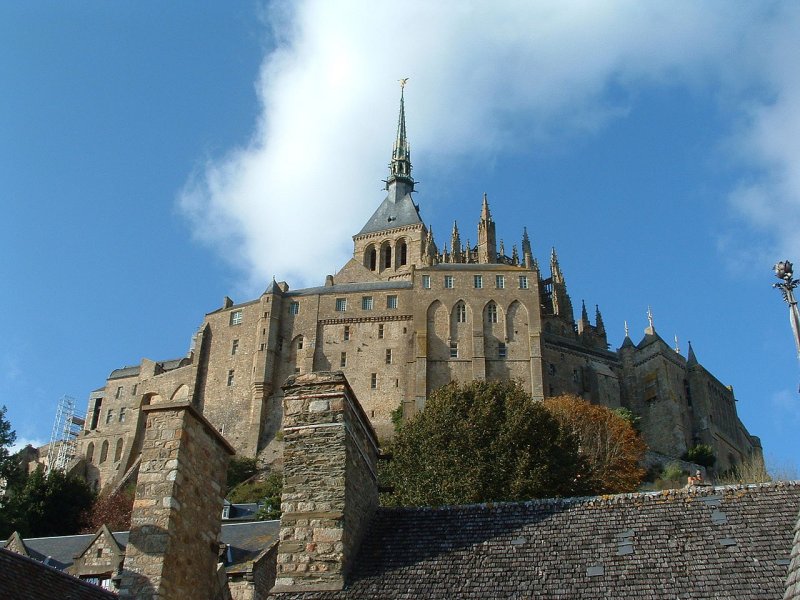 View of the abbey of Mont Saint-Michel from the base
View of the abbey of Mont Saint-Michel from the baseSource: https://commons.wikimedia.org/wiki/Category:General_views_of_Mont_Saint-Michel#mediaviewer/File:Mt_ST_michel_10.JPG
Author: Mt ST michel 10, author unknown

Mont Saint-Michel was inscribed on the World Heritage List in 1979 for its rich cultural, historical, and architectural significance. It is a member of the Organization of World Heritage Cities.
Getting there
The easiest way to reach Mont St Michel, apart from joining a tour package, is to drive. Journey from Paris by car is about 4.5 hours. Take the A84 motorway from Caen to Pontorson, and then exit to Avranches. Continue into D43 and look for the sign pointing to Mont-St-Micheol. Parking fee is €4.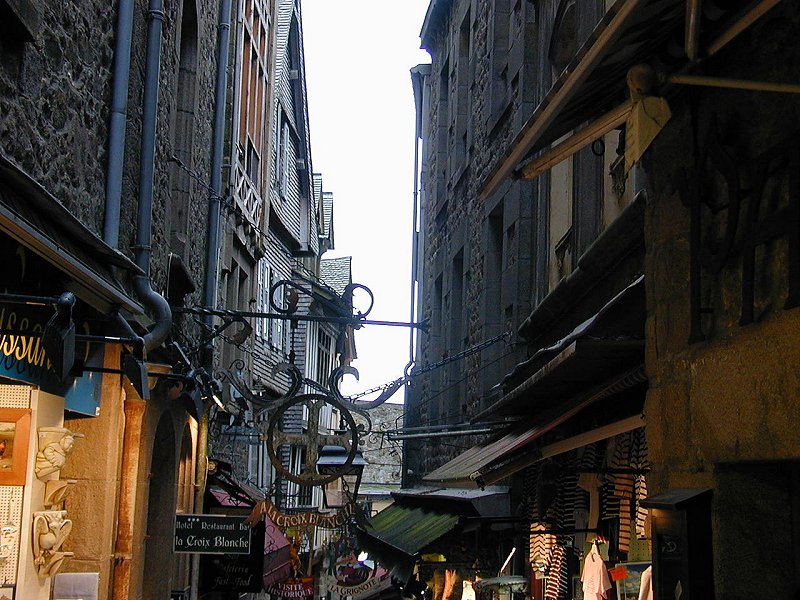 A street at Mont Saint-Michel
A street at Mont Saint-MichelSource: https://commons.wikimedia.org/wiki/Category:Mont_Saint-Michel#mediaviewer/File:200506_-_Mont_Saint-Michel_20_-_Street.JPG
Author: Semnoz

What to see and do
The entire village of Mont-St-Michel is worth exploring, but the two main tourist sights are the Abbey of Mont-St-Michel and the Notre-Dame Sous Terre Chapel. The Abbey is open from 2 May to 30 August from 9:00am to 7:00pm and from 1 September to 30 April from 9:30am to 6:00pm. Entrance fee is €8.50 for adults and €5.00 for youths aged 18-25. Audio tours can be rented for €4.00, available in French, English, German, Spanish and Italian.While at Mont-St-Michel, be sure to try its omelettes, a local specialty. Another specialty is its saltmarsh lamb, made from meat of lamb reared in the marshland around the mount. These are available at the restaurants.
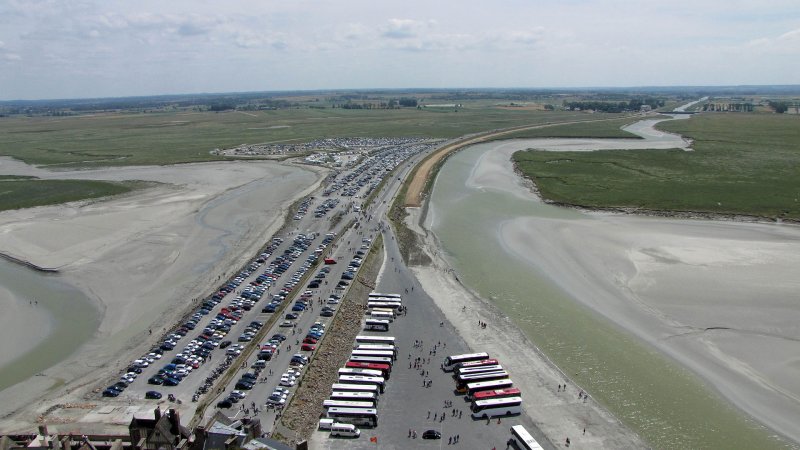 View of the causeway and parking area of Mont Saint-Michel
View of the causeway and parking area of Mont Saint-MichelSource: https://commons.wikimedia.org/wiki/Category:Mont_Saint-Michel#mediaviewer/File:Le_Mont-Saint-Michel_(Vue_sur_le_parking).JPG
Author: Julien1978

 Latest updates on Penang Travel Tips
Latest updates on Penang Travel Tips

Copyright © 2003-2025 Timothy Tye. All Rights Reserved.

 Go Back
Go Back